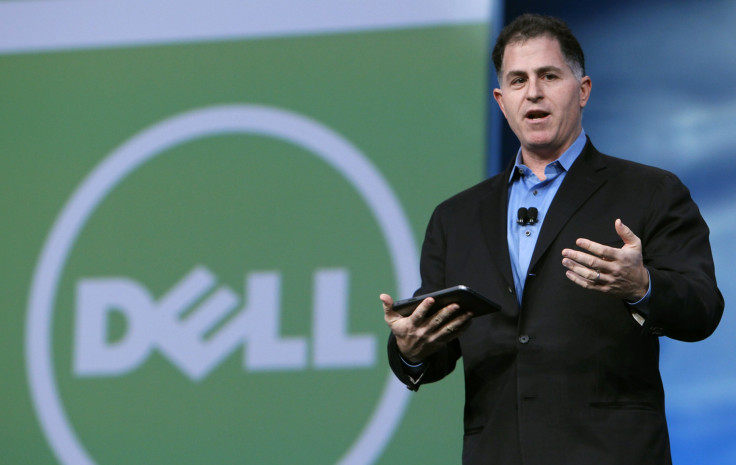Memo To Michael Dell: Do You Want To Remain Your Own Boss?
Dell's Decision: Keep Control Or Go Private

Over the past six weeks, speculation has been rampant that Dell (NASDAQ:DELL), the No. 3 PC maker, might consider going private. In that time, the depressed shares have jumped more than 22 percent, valuing the company at $21.87 billion, especially after a surge this week.
Rather than spend time polishing fourth-quarter sales for the period ending Jan. 25, founding CEO Michael S. Dell and his senior staff are believed to be evaluating a deal from Silver Lake Partners, the Menlo Park, Calif., private equity firm that manages $14 billion; Singapore’s Temasek state holding company and the Canadian Pension Plan Investment Board about taking the company private.
Reports say bank financing could be provided by JPMorgan Chase (NYSE:JPM), which is advising Dell, along with Royal Bank of Canada (NYSE:RY), Credit Suisse (NYSE:CS) and Bank of America (NYSE:BAC).
Dell and its reported investors and financiers have declined comment. In Wednesday trading, the shares fell 57 cents to $12.59.
A Dell management buyout, under which the entire company would be acquired by Silver Lake and its partners, with bank cash to pay off the remaining investors (Dell himself owns 15.7 percent of the company) would exceed $20 billion. For years, cash flow from operations would flow to the new owners and bankers to pay off the loans.
Indeed, a Dell buyout would be the biggest in technology since the 2007 buyout of Freescale Semiconductor (NYSE:FSL) by P/E groups headed by Blackstone Group (NYSE:BX), TPG, Permira Funds and Carlyle Group (NYSE:CG).
On the plus side, here are some good reasons to go private:
Remove Dell from quarterly reporting. Without bothering with announcing quarterly results, management would be freed from a burden, saving management time and expense. There’d be no closing share price, of course, but Dell, with some new directors from Silver Lake and its nominees, would be under constant scrutiny.
Other technology companies have gone private successfully. With nearly $14 billion in acquisitions over the past four years, Dell has tried to transform itself from the old “PCs Unlimited” that built consumer-ordered PCs into a provider of enterprise services. It bought Perot Systems, SonicWall, Quest Software, Wyse Technology, Compellent Technologies, Force10 Networks and more to add more lucrative software and services to the mix.
Going private would leave the company, which had $14.2 billion in cash, mostly outside the U.S., as of Nov. 2, free to make acquisitions and add services, without being second-guessed. Dell could compete against Hewlett-Packard Co. (NYSE:HPQ), the No. 1 computer company and International Business Machines Corp. (NYSE:IBM), the No. 2 computer company, especially in enterprises where the Dell name is trusted.
Formerly public companies including Kronos, the time-keeping specialist, as well as SunGard Data Systems, the financial backbone provider, have been private for years; their CEOs say they are happy that way and making money.
Going private could aid transition. Besides services, storage products and software, Dell needs new products to survive. It’s nowhere in the tablet sector and hasn’t made plans for a smartphone. With its excellent relations with Intel Corp. (NASDAQ:INTC), it could devise winning products, perhaps a tablet for the enterprise market. Or move into medical electronics as the Affordable Health Care Act kicks in and requires more recordkeeping.
Going private can be reversed. Usually, P/E investors want to cash out of an investment within five years, which could mean by 2018, Dell could come back to the market as a public company, strengthened by its transformation and presumably bolstered by new customers, especially in Asia, where the company has had very successful manufacturing ventures in China, India, Malaysia and the Philippines.
On the minus side:
Going private surrenders control. Michael Dell, 47, controls about 16 percent of the equity now, giving him a big say in decisions. Although there are some impressive directors in their own right, including former AMR Corp. (PINK:AAMRQ) CEO Donald Carty and Alex Mandl, a former president of AT&T Inc. (NYSE:T), the No. 1 telecommunications carrier, he’s his own boss.
In 2004, Dell retired as CEO in favor of Kevin Rollins, who messed up the company badly. It lost ground to HP and had to pay the Securities and Exchange Commission $100 million to settle an accounting scandal, prompting Dell’s return to the executive suite. Why cede control now to Silver Lake and the bankers, who’ll collect fees for every step of the deal?
Going private could limit options. Tying up Dell with so many financial strings could impede the ability to move quickly. For example, Dell might want to sell its manufacturing lines to an Asian buyer. Even the whiff of such news would send the share up, although there’d be pressure for dividends to shareholders.
As well, by not being public, the Dell brand might not be so prominent. When you have your surname on every product, the brand is clearly important. In the past, when there were problems with quality and internal management, Dell said he’d fix them personally. He did.
Going private may not work. Rather than use cash flow for expansion and adding to the pile for acquisitions, in a buyout, its first destination is paying down debt. For the year ending Nov. 2, the company’s cash flow was about $3 billion. In a buyout, that would mainly go to Silver Lake and the banks, rather than to Dell Inc.
All things considered, Dell himself would appear to be the last person to surrender control of his empire. He’s No. 22 on the Forbes 400 list, with an estimated personal wealth of $14.6 billion.
This will be a momentous decision.
© Copyright IBTimes 2024. All rights reserved.












